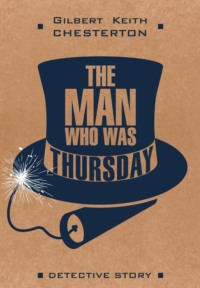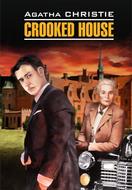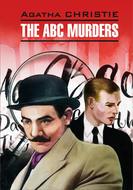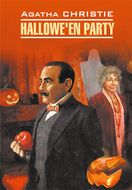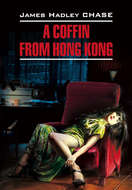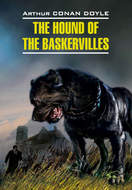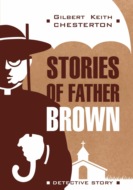Kitabı oku: «Человек, который был Четвергом / The man who was Thursday. Книга для чтения на английском языке», sayfa 2
Chapter II. The Secret of Gabriel Syme
THE cab pulled up before a particularly dreary and greasy beershop, into which Gregory rapidly conducted his companion. They seated themselves in a close and dim sort of bar-parlour, at a stained wooden table with one wooden leg. The room was so small and dark, that very little could be seen of the attendant who was summoned, beyond a vague and dark impression of something bulky and bearded.
“Will you take a little supper?” asked Gregory politely. “The pât€e de foie gras4 is not good here, but I can recommend the game.”
Syme received the remark with stolidity, imagining it to be a joke. Accepting the vein of humour, he said, with a well-bred indifference:
“Oh, bring me some lobster mayonnaise.”
To his indescribable astonishment, the man only said “Certainly, sir!” and went away apparently to get it.
“What will you drink?” resumed Gregory, with the same careless yet apologetic air. “I shall only have a cr€eme de menthe5 myself; I have dined. But the champagne can really be trusted. Do let me start you with a half-bottle of Pommery at least?”
“Thank you!” said the motionless Syme. “You are very good.”
His further attempts at conversation, somewhat disorganised in themselves, were cut short finally as by a thunderbolt by the actual appearance of the lobster. Syme tasted it, and found it particularly good. Then he suddenly began to eat with great rapidity and appetite.
“Excuse me if I enjoy myself rather obviously!” he said to Gregory, smiling. “I don’t often have the luck to have a dream like this. It is new to me for a nightmare to lead to a lobster. It is commonly the other way.”
“You are not asleep, I assure you,” said Gregory. “You are, on the contrary, close to the most actual and rousing moment of your existence. Ah, here comes your champagne! I admit that there may be a slight disproportion, let us say, between the inner arrangements of this excellent hotel and its simple and unpretentious exterior. But that is all our modesty. We are the most modest men that ever lived on earth.”
“And who are we?” asked Syme, emptying his champagne glass.
“It is quite simple,” replied Gregory. “We are the serious anarchists, in whom you do not believe.”
“Oh!” said Syme shortly. “You do yourselves well in drinks.6”
“Yes, we are serious about everything,” answered Gregory.
Then after a pause he added:
“If in a few moments this table begins to turn round a little, don’t put it down to your inroads into the champagne. I don’t wish you to do yourself an injustice.”
“Well, if I am not drunk, I am mad,” replied Syme with perfect calm; “but I trust I can behave like a gentleman in either condition. May I smoke?”
“Certainly!” said Gregory, producing a cigar-case. “Try one of mine.”
Syme took the cigar, clipped the end off with a cigar-cutter out of his waistcoat pocket, put it in his mouth, lit it slowly, and let out a long cloud of smoke. It is not a little to his credit that he performed these rites with so much composure, for almost before he had begun them the table at which he sat had begun to revolve, first slowly, and then rapidly, as if at an insane seance.
“You must not mind it,” said Gregory; “it’s a kind of screw.”
“Quite so,” said Syme placidly, “a kind of screw. How simple that is!”
The next moment the smoke of his cigar, which had been wavering across the room in snaky twists, went straight up as if from a factory chimney, and the two, with their chairs and table, shot down through the floor as if the earth had swallowed them. They went rattling down a kind of roaring chimney as rapidly as a lift cut loose, and they came with an abrupt bump to the bottom. But when Gregory threw open a pair of doors and let in a red subterranean light, Syme was still smoking with one leg thrown over the other, and had not turned a yellow hair7.
Gregory led him down a low, vaulted passage, at the end of which was the red light. It was an enormous crimson lantern, nearly as big as a fireplace, fixed over a small but heavy iron door. In the door there was a sort of hatchway or grating, and on this Gregory struck five times. A heavy voice with a foreign accent asked him who he was. To this he gave the more or less unexpected reply, “Mr. Joseph Chamberlain.” The heavy hinges began to move; it was obviously some kind of password.
Inside the doorway the passage gleamed as if it were lined with a network of steel. On a second glance, Syme saw that the glittering pattern was really made up of ranks and ranks of rifles and revolvers, closely packed or interlocked.
“I must ask you to forgive me all these formalities,” said Gregory; “we have to be very strict here.”
“Oh, don’t apologise,” said Syme. “I know your passion for law and order,” and he stepped into the passage lined with the steel weapons. With his long, fair hair and rather foppish frock-coat, he looked a singularly frail and fanciful figure as he walked down that shining avenue of death.
They passed through several such passages, and came out at last into a queer steel chamber with curved walls, almost spherical in shape, but presenting, with its tiers of benches, something of the appearance of a scientific lecture-theatre. There were no rifles or pistols in this apartment, but round the walls of it were hung more dubious and dreadful shapes, things that looked like the bulbs of iron plants, or the eggs of iron birds. They were bombs, and the very room itself seemed like the inside of a bomb. Syme knocked his cigar ash off against the wall, and went in.
“And now, my dear Mr. Syme,” said Gregory, throwing himself in an expansive manner on the bench under the largest bomb, “now we are quite cosy, so let us talk properly. Now no human words can give you any notion of why I brought you here. It was one of those quite arbitrary emotions, like jumping off a cliff or falling in love. Suffice it to say that you were an inexpressibly irritating fellow, and, to do you justice, you are still. I would break twenty oaths of secrecy for the pleasure of taking you down a peg. That way you have of lighting a cigar would make a priest break the seal of confession8. Well, you said that you were quite certain I was not a serious anarchist. Does this place strike you as being serious?”
“It does seem to have a moral under all its gaiety,” assented
Syme; “but may I ask you two questions? You need not fear to give me information, because, as you remember, you very wisely extorted from me a promise not to tell the police, a promise I shall certainly keep. So it is in mere curiosity that I make my queries.
First of all, what is it really all about? What is it you object to? You want to abolish Government?”
“To abolish God!” said Gregory, opening the eyes of a fanatic. “We do not only want to upset a few despotisms and police regulations; that sort of anarchism does exist, but it is a mere branch of the Nonconformists. We dig deeper and we blow you higher. We wish to deny all those arbitrary distinctions of vice and virtue, honour and treachery, upon which mere rebels base themselves. The silly sentimentalists of the French Revolution talked of the Rights of Man! We hate Rights as we hate Wrongs. We have abolished Right and Wrong.”
“And Right and Left,” said Syme with a simple eagerness, “I hope you will abolish them too. They are much more troublesome to me.”
“You spoke of a second question,” snapped Gregory.
“With pleasure,” resumed Syme. “In all your present acts and surroundings there is a scientific attempt at secrecy. I have an aunt who lived over a shop, but this is the first time I have found people living from preference under a public-house. You have a heavy iron door. You cannot pass it without submitting to the humiliation of calling yourself Mr. Chamberlain. You surround yourself with steel instruments which make the place, if I may say so, more impressive than homelike. May I ask why, after taking all this trouble to barricade yourselves in the bowels of the earth, you then parade your whole secret by talking about anarchism to every silly woman in Saffron Park?”
Gregory smiled.
“The answer is simple,” he said. “I told you I was a serious anarchist, and you did not believe me. Nor do they believe me. Unless I took them into this infernal room they would not believe me.”
Syme smoked thoughtfully, and looked at him with interest. Gregory went on.
“The history of the thing might amuse you,” he said. “When first I became one of the New Anarchists I tried all kinds of respectable disguises. I dressed up as a bishop. I read up all about bishops in our anarchist pamphlets, in Superstition the Vampire and Priests of Prey. I certainly understood from them that bishops are strange and terrible old men keeping a cruel secret from mankind.
I was misinformed. When on my first appearing in episcopal gaiters in a drawing-room I cried out in a voice of thunder, ‘Down! down! presumptuous human reason!’ they found out in some way that I was not a bishop at all. I was nabbed at once. Then I made up as a millionaire; but I defended Capital with so much intelligence that a fool could see that I was quite poor. Then I tried being a major. Now I am a humanitarian myself, but I have, I hope, enough intellectual breadth to understand the position of those who, like Nietzsche9, admire violence – the proud, mad war of Nature and all that, you know. I threw myself into the major. I drew my sword and waved it constantly. I called out ‘Blood!’ abstractedly, like a man calling for wine. I often said, ‘Let the weak perish; it is the Law.’ Well, well, it seems majors don’t do this. I was nabbed again. At last I went in despair to the President of the Central Anarchist Council, who is the greatest man in Europe.”
“What is his name?” asked Syme.
“You would not know it,” answered Gregory. “That is his greatness. Caesar and Napoleon put all their genius into being heard of, and they were heard of. He puts all his genius into not being heard of, and he is not heard of. But you cannot be for five minutes in the room with him without feeling that Caesar and Napoleon would have been children in his hands.”
He was silent and even pale for a moment, and then resumed:
“But whenever he gives advice it is always something as startling as an epigram, and yet as practical as the Bank of England. I said to him, ‘What disguise will hide me from the world? What can I find more respectable than bishops and majors?’ He looked at me with his large but indecipherable face. ‘You want a safe disguise, do you? You want a dress which will guarantee you harmless; a dress in which no one would ever look for a bomb?’ I nodded. He suddenly lifted his lion’s voice. ‘Why, then, dress up as an anarchist, you fool!’ he roared so that the room shook. ‘Nobody will ever expect you to do anything dangerous then.’ And he turned his broad back on me without another word. I took his advice, and have never regretted it. I preached blood and murder to those women day and night, and – by God! – they would let me wheel their perambulators.”
Syme sat watching him with some respect in his large, blue eyes.
“You took me in,” he said. “It is really a smart dodge.” Then after a pause he added:
“What do you call this tremendous President of yours?”
“We generally call him Sunday,” replied Gregory with simplicity. “You see, there are seven members of the Central Anarchist Council, and they are named after days of the week. He is called Sunday, by some of his admirers Bloody Sunday. It is curious you should mention the matter, because the very night you have dropped in (if I may so express it) is the night on which our London branch, which assembles in this room, has to elect its own deputy to fill a vacancy in the Council. The gentleman who has for some time past played, with propriety and general applause, the difficult part of Thursday, has died quite suddenly. Consequently, we have called a meeting this very evening to elect a successor.”
He got to his feet and strolled across the room with a sort of smiling embarrassment.
“I feel somehow as if you were my mother, Syme,” he continued casually. “I feel that I can confide anything to you, as you have promised to tell nobody. In fact, I will confide to you something that I would not say in so many words to the anarchists who will be coming to the room in about ten minutes. We shall, of course, go through a form of election; but I don’t mind telling you that it is practically certain what the result will be.” He looked down for a moment modestly. “It is almost a settled thing that I am to be Thursday.”
“My dear fellow,” said Syme heartily, “I congratulate you. A great career!”
Gregory smiled in deprecation, and walked across the room, talking rapidly.
“As a matter of fact, everything is ready for me on this table,” he said, “and the ceremony will probably be the shortest possible.”
Syme also strolled across to the table, and found lying across it a walking-stick, which turned out on examination to be a sword-stick, a large Colt’s revolver, a sandwich case, and a formidable flask of brandy. Over the chair, beside the table, was thrown a heavy-looking cape or cloak.
“I have only to get the form of election finished,” continued Gregory with animation, “then I snatch up this cloak and stick, stuff these other things into my pocket, step out of a door in this cavern, which opens on the river, where there is a steam-tug already waiting for me, and then – then – oh, the wild joy of being Thursday!” And he clasped his hands.
Syme, who had sat down once more with his usual insolent languor, got to his feet with an unusual air of hesitation.
“Why is it,” he asked vaguely, “that I think you are quite a decent fellow? Why do I positively like you, Gregory?” He paused a moment, and then added with a sort of fresh curiosity, “Is it because you are such an ass?”
There was a thoughtful silence again, and then he cried out, “Well, damn it all! this is the funniest situation I have ever been in in my life, and I am going to act accordingly. Gregory, I gave you a promise before I came into this place. That promise I would keep under red-hot pincers10. Would you give me, for my own safety, a little promise of the same kind?”
“A promise?” asked Gregory, wondering.
“Yes,” said Syme very seriously, “a promise. I swore before God that I would not tell your secret to the police. Will you swear by Humanity, or whatever beastly thing you believe in, that you will not tell my secret to the anarchists?”
“Your secret?” asked the staring Gregory. “Have you got a secret?”
“Yes,” said Syme, “I have a secret.” Then after a pause, “Will you swear?”
Gregory glared at him gravely for a few moments, and then said abruptly:
“You must have bewitched me, but I feel a furious curiosity about you. Yes, I will swear not to tell the anarchists anything you tell me. But look sharp11, for they will be here in a couple of minutes.”
Syme rose slowly to his feet and thrust his long, white hands into his long, grey trousers’ pockets. Almost as he did so there came five knocks on the outer grating, proclaiming the arrival of the first of the conspirators.
“Well,” said Syme slowly, “I don’t know how to tell you the truth more shortly than by saying that your expedient of dressing up as an aimless poet is not confined to you or your President. We have known the dodge for some time at Scotland Yard.”
Gregory tried to spring up straight, but he swayed thrice.
“What do you say?” he asked in an inhuman voice.
“Yes,” said Syme simply, “I am a police detective. But I think I hear your friends coming.”
From the doorway there came a murmur of “Mr. Joseph Chamberlain.” It was repeated twice and thrice, and then thirty times, and the crowd of Joseph Chamberlains (a solemn thought) could be heard trampling down the corridor.
Chapter III. The Man Who Was Thursday
BEFORE one of the fresh faces could appear at the doorway, Gregory’s stunned surprise had fallen from him. He was beside the table with a bound, and a noise in his throat like a wild beast.
He caught up the Colt’s revolver and took aim at Syme. Syme did not flinch, but he put up a pale and polite hand.
“Don’t be such a silly man,” he said, with the effeminate dignity of a curate. “Don’t you see it’s not necessary? Don’t you see that we’re both in the same boat? Yes, and jolly sea-sick.”
Gregory could not speak, but he could not fire either, and he looked his question.
“Don’t you see we’ve checkmated each other?” cried Syme. “I can’t tell the police you are an anarchist. You can’t tell the anarchists I’m a policeman. I can only watch you, knowing what you are; you can only watch me, knowing what I am. In short, it’s a lonely, intellectual duel, my head against yours. I’m a policeman deprived of the help of the police. You, my poor fellow, are an anarchist deprived of the help of that law and organisation which is so essential to anarchy. The one solitary difference is in your favour. You are not surrounded by inquisitive policemen; I am surrounded by inquisitive anarchists. I cannot betray you, but I might betray myself. Come, come! wait and see me betray myself. I shall do it so nicely.”
Gregory put the pistol slowly down, still staring at Syme as if he were a sea-monster.
“I don’t believe in immortality,” he said at last, “but if, after all this, you were to break your word, God would make a hell only for you, to howl in for ever.”
“I shall not break my word,” said Syme sternly, “nor will you break yours. Here are your friends.”
The mass of the anarchists entered the room heavily, with a slouching and somewhat weary gait; but one little man, with a black beard and glasses – a man somewhat of the type of Mr. Tim Healy – detached himself, and bustled forward with some papers in his hand.
“Comrade Gregory,” he said, “I suppose this man is a delegate?”
Gregory, taken by surprise, looked down and muttered the name of Syme; but Syme replied almost pertly:
“I am glad to see that your gate is well enough guarded to make it hard for anyone to be here who was not a delegate.”
The brow of the little man with the black beard was, however, still contracted with something like suspicion.
“What branch do you represent?” he asked sharply.
“I should hardly call it a branch,” said Syme, laughing; “I should call it at the very least a root.”
“What do you mean?”
“The fact is,” said Syme serenely, “the truth is I am a Sabbatarian. I have been specially sent here to see that you show a due observance of Sunday.”
The little man dropped one of his papers, and a flicker of fear went over all the faces of the group. Evidently the awful President, whose name was Sunday, did sometimes send down such irregular ambassadors to such branch meetings.
“Well, comrade,” said the man with the papers after a pause, “I suppose we’d better give you a seat in the meeting?”
“If you ask my advice as a friend,” said Syme with severe benevolence, “I think you’d better.”
When Gregory heard the dangerous dialogue end, with a sudden safety for his rival, he rose abruptly and paced the floor in painful thought. He was, indeed, in an agony of diplomacy. It was clear that Syme’s inspired impudence was likely to bring him out of all merely accidental dilemmas. Little was to be hoped from them. He could not himself betray Syme, partly from honour, but partly also because, if he betrayed him and for some reason failed to destroy him, the Syme who escaped would be a Syme freed from all obligation of secrecy, a Syme who would simply walk to the nearest police station. After all, it was only one night’s discussion, and only one detective who would know of it. He would let out as little as possible of their plans that night, and then let Syme go, and chance it.
He strode across to the group of anarchists, which was already distributing itself along the benches.
“I think it is time we began,” he said; “the steam-tug is waiting on the river already. I move that Comrade Buttons takes the chair.”
This being approved by a show of hands, the little man with the papers slipped into the presidential seat.
“Comrades,” he began, as sharp as a pistol-shot, “our meeting tonight is important, though it need not be long. This branch has always had the honour of electing Thursdays for the Central European Council. We have elected many and splendid Thursdays. We all lament the sad decease of the heroic worker who occupied the post until last week. As you know, his services to the cause were considerable. He organised the great dynamite coup of Brighton which, under happier circumstances, ought to have killed everybody on the pier. As you also know, his death was as self-denying as his life, for he died through his faith in a hygienic mixture of chalk and water as a substitute for milk, which beverage he regarded as barbaric, and as involving cruelty to the cow. Cruelty, or anything approaching to cruelty, revolted him always. But it is not to acclaim his virtues that we are met, but for a harder task. It is difficult properly to praise his qualities, but it is more difficult to replace them. Upon you, comrades, it devolves this evening to choose out of the company present the man who shall be Thursday. If any comrade suggests a name I will put it to the vote. If no comrade suggests a name, I can only tell myself that that dear dynamiter, who is gone from us, has carried into the unknowable abysses the last secret of his virtue and his innocence.”
There was a stir of almost inaudible applause, such as is sometimes heard in church. Then a large old man, with a long and venerable white beard, perhaps the only real working-man present, rose lumberingly and said:
“I move that Comrade Gregory be elected Thursday,” and sat lumberingly down again.
“Does anyone second?12” asked the chairman.
A little man with a velvet coat and pointed beard seconded.
“Before I put the matter to the vote,” said the chairman, “I will call on Comrade Gregory to make a statement.”
Gregory rose amid a great rumble of applause. His face was deadly pale, so that by contrast his queer red hair looked almost scarlet. But he was smiling and altogether at ease. He had made up his mind, and he saw his best policy quite plain in front of him like a white road. His best chance was to make a softened and ambiguous speech, such as would leave on the detective’s mind the impression that the anarchist brotherhood was a very mild affair after all. He believed in his own literary power, his capacity for suggesting fine shades and picking perfect words13. He thought that with care he could succeed, in spite of all the people around him, in conveying an impression of the institution, subtly and delicately false. Syme had once thought that anarchists, under all their bravado, were only playing the fool. Could he not now, in the hour of peril, make Syme think so again?
“Comrades,” began Gregory, in a low but penetrating voice, “it is not necessary for me to tell you what is my policy, for it is your policy also. Our belief has been slandered, it has been disfigured, it has been utterly confused and concealed, but it has never been altered. Those who talk about anarchism and its dangers go everywhere and anywhere to get their information, except to us, except to the fountain head14. They learn about anarchists from sixpenny novels; they learn about anarchists from tradesmen’s newspapers; they learn about anarchists from Ally Sloper’s Half-Holiday and the Sporting Times. They never learn about anarchists from anarchists. We have no chance of denying the mountainous slanders which are heaped upon our heads from one end of Europe to another. The man who has always heard that we are walking plagues has never heard our reply. I know that he will not hear it tonight, though my passion were to rend the roof. For it is deep, deep under the earth that the persecuted are permitted to assemble, as the Christians assembled in the Catacombs. But if, by some incredible accident, there were here tonight a man who all his life had thus immensely misunderstood us, I would put this question to him: ‘When those Christians met in those Catacombs, what sort of moral reputation had they in the streets above? What tales were told of their atrocities by one educated Roman to another? Suppose’ (I would say to him), ‘suppose that we are only repeating that still mysterious paradox of history. Suppose we seem as shocking as the Christians because we are really as harmless as the Christians. Suppose we seem as mad as the Christians because we are really as meek.’”
The applause that had greeted the opening sentences had been gradually growing fainter, and at the last word it stopped suddenly. In the abrupt silence, the man with the velvet jacket said, in a high, squeaky voice:
“I’m not meek!”
“Comrade Witherspoon tells us,” resumed Gregory, “that he is not meek. Ah, how little he knows himself! His words are, indeed, extravagant; his appearance is ferocious, and even (to an ordinary taste) unattractive. But only the eye of a friendship as deep and delicate as mine can perceive the deep foundation of solid meekness which lies at the base of him, too deep even for himself to see. I repeat, we are the true early Christians, only that we come too late. We are simple, as they revere simple – look at Comrade Witherspoon. We are modest, as they were modest – look at me. We are merciful—”
“No, no!” called out Mr. Witherspoon with the velvet jacket.
“I say we are merciful,” repeated Gregory furiously, “as the early Christians were merciful. Yet this did not prevent their being accused of eating human flesh. We do not eat human flesh—”
“Shame!15” cried Witherspoon. “Why not?”
“Comrade Witherspoon,” said Gregory, with a feverish gaiety, “is anxious to know why nobody eats him (laughter). In our society, at any rate, which loves him sincerely, which is founded upon love—”
“No, no!” said Witherspoon, “down with love16.”
“Which is founded upon love,” repeated Gregory, grinding his teeth, “there will be no difficulty about the aims which we shall pursue as a body, or which I should pursue were I chosen as the representative of that body. Superbly careless of the slanders that represent us as assassins and enemies of human society, we shall pursue with moral courage and quiet intellectual pressure, the permanent ideals of brotherhood and simplicity.”
Gregory resumed his seat and passed his hand across his forehead. The silence was sudden and awkward, but the chairman rose like an automaton, and said in a colourless voice:
“Does anyone oppose the election of Comrade Gregory?”
The assembly seemed vague and subconsciously disappointed, and Comrade Witherspoon moved restlessly on his seat and muttered in his thick beard. By the sheer rush of routine, however, the motion would have been put and carried. But as the chairman was opening his mouth to put it, Syme sprang to his feet and said in a small and quiet voice:
“Yes, Mr. Chairman, I oppose.”
The most effective fact in oratory is an unexpected change in the voice. Mr. Gabriel Syme evidently understood oratory. Having said these first formal words in a moderated tone and with a brief simplicity, he made his next word ring and volley in the vault as if one of the guns had gone off.
“Comrades!” he cried, in a voice that made every man jump out of his boots, “have we come here for this? Do we live underground like rats in order to listen to talk like this? This is talk we might listen to while eating buns at a Sunday School treat. Do we line these walls with weapons and bar that door with death lest anyone should come and hear Comrade Gregory saying to us, ‘Be good, and you will be happy,’ ‘Honesty is the best policy,’ and ‘Virtue is its own reward’? There was not a word in Comrade Gregory’s address to which a curate could not have listened with pleasure (hear, hear17). But I am not a curate (loud cheers), and I did not listen to it with pleasure (renewed cheers). The man who is fitted to make a good curate is not fitted to make a resolute, forcible, and efficient Thursday (hear, hear).”
“Comrade Gregory has told us, in only too apologetic a tone, that we are not the enemies of society. But I say that we are the enemies of society, and so much the worse for society. We are the enemies of society, for society is the enemy of humanity, its oldest and its most pitiless enemy (hear, hear). Comrade Gregory has told us (apologetically again) that we are not murderers. There I agree. We are not murderers, we are executioners (cheers).”
Ever since Syme had risen Gregory had sat staring at him, his face idiotic with astonishment. Now in the pause his lips of clay parted, and he said, with an automatic and lifeless distinctness:
“You damnable hypocrite!”
Syme looked straight into those frightful eyes with his own pale blue ones, and said with dignity:
“Comrade Gregory accuses me of hypocrisy. He knows as well as I do that I am keeping all my engagements and doing nothing but my duty. I do not mince words. I do not pretend to. I say that Comrade Gregory is unfit to be Thursday for all his amiable qualities. He is unfit to be Thursday because of his amiable qualities. We do not want the Supreme Council of Anarchy infected with a maudlin mercy (hear, hear). This is no time for ceremonial politeness, neither is it a time for ceremonial modesty. I set myself against Comrade Gregory as I would set myself against all the Governments of Europe, because the anarchist who has given himself to anarchy has forgotten modesty as much as he has forgotten pride (cheers). I am not a man at all. I am a cause (renewed cheers). I set myself against Comrade Gregory as impersonally and as calmly as I should choose one pistol rather than another out of that rack upon the wall; and I say that rather than have Gregory and his milk-and-water methods on the Supreme Council, I would offer myself for election—”
His sentence was drowned in a deafening cataract of applause. The faces, that had grown fiercer and fiercer with approval as his tirade grew more and more uncompromising, were now distorted with grins of anticipation or cloven with delighted cries. At the moment when he announced himself as ready to stand for the post of Thursday, a roar of excitement and assent broke forth, and became uncontrollable, and at the same moment Gregory sprang to his feet, with foam upon his mouth, and shouted against the shouting.
